- Home
- Laura Resnick
A Wilder Name Page 5
A Wilder Name Read online
Page 5
“So-called music?” echoed Joe, the youngest of the four sons. He was a year older than Nina. “Pop, we’ve been over this before—”
“And I still say that a lot of guitars and drums and long-haired people screaming about sex does not qualify as music. Nina agrees with me, don’t you Nina?”
Nina was laughing.
Joe wasn’t about to give up that easily. “Pop, I agree that a lot of guitars and drums and long-haired people screaming about sex does not qualify as music, but—”
“Then we’re in complete agreement, and for once we can have a peaceful family supper,” interrupted Stefano.
Nina laughed harder, and Joe turned purple with irritation.
The whole family jumped in then, everyone shouting, everyone emphatically expressing the right viewpoint if everyone else would just listen for a minute. Soon the dog was running around the table, barking merrily. Everything was complete: A typical Sunday with the Gnagnarellis, Nina thought.
Holding her head in her hands, she remembered Luke’s words. Yes, she had been irresistibly drawn to Philippe’s quiet, elegant ways in direct contrast to her own background. She enjoyed her new life-style and would never return to a life in which she didn’t know elegance, culture, and refinement. But, she thought, looking around at her lively, enthusiastic family, she had also missed their way of life when living with Philippe.
“Joseph! Joseph!” Stefano shouted into Nina’s ear. “You’re giving Nina a headache!”
“I’m not the one giving it to her! If you’d stop shouting your ignorant, underdeveloped, narrow-minded opinions into her ear—”
“If good taste is narrow-minded—”
“Yours certainly is!”
“You’re all doing this,” Nina said quietly, “because you know I’m not allowed to shout.”
“Nina, tell this opinionated young idiot—”
“Grandpa, don’t say that—”
“Mom, we’re still going to the concert with Nina, aren’t we?”
“Dad, the dog took my pizza!”
“How hungry can he be? Are you sure you didn’t just drop it?”
Nina sighed and concentrated on her food. It was a good ten minutes before conversation reached a normal pitch.
“So Nina’s taking you to this concert?” Stefano politely asked Maria and her sister Angela, as though the previous conversation had never happened.
“Yeah, Grandpa. She said we can stay the night at her apartment in the city and maybe do something the next day.”
“So, Nina, do a want go to a rock ‘n’ roll concert?”
“I don’t mind taking the girls, Pop,” Nina hedged. “And I can introduce them to Luke Swain, which will be nice for them.”
“I’ve heard of Luke Swain, Stef,” said Nina’s mother. “He’s supposed to be very intelligent, very outspoken. You should be glad the girls want to hear his music.”
“Yeah, Pop,” agreed Michael. “It’s very good. It’s not for teenyboppers.” His daughters glared at him.
“Yeah, Michael and I listen to it, too,” agreed Nancy.
“He’s gorgeous,” chipped in Mark’s pregnant wife. Nina wished they would all change the subject.
“I have every one of his albums,” said Maria proudly.
“You do?” Nina’s attention was caught. “Maria, do you think I could borrow them for a week?” Maria’s expression was as negative as if Nina had asked to borrow both her kidneys for a week. “Never mind,” Nina sighed. Perhaps she would buy one or two, after all.
After their disastrous first meeting, Nina hadn’t thought she’d ever see Luke Swain again. And after the unexpected turn of their second meeting, she had promised herself she would stay away from him. Yet she had just agreed to walk into the lion’s den. It’s the last time, she told herself. The last time, she repeated, digging into her zabaglione.
* * * *
As it turned out, Nina’s week was too hectic for her to worry about the following weekend, let alone buy records.
With the opening night of Rigoletto less than three weeks away, Nina’s time and concentration were absorbed by the production. She felt that singing Gilda in New York could be the biggest step in her career, to date, if she could unlock the heart of the character. Her singing was going well. She had an excellent rapport with Giorgio Bellanti who was singing Rigoletto, and they both worked well with the director. But the basic quality of the woman, the passions, which surged in her and changed her, were still eluding Nina. And it was not enough to simply stand up and sing well.
Not given to panic, Nina simply tripled her concentration, canceled all social engagements and gave every ounce of her strength to trying to make Gilda come to life.
Consequently, she was already very tired and rather ill-tempered when Saturday night arrived. She was not in the mood to see her first rock concert. But she couldn’t disappoint her nieces who’d been counting on it all week. She met Maria and Angela coming into the city on a train from their home in Westchester County, and the three of them boarded the train out to Long Island.
They found the stadium easily, by following everyone else—there seemed to be no one who wasn’t going to this concert. Once at the stadium, Nina spent some time finding the correct window for their tickets. She kept the girls close to her as she wandered around. Who could say what kind of people were lurking about?
Tickets in hand, Nina then gave in and bought her nieces outrageously priced program books with “full color pictures,” root beer, popcorn, and three T-shirts: one with a picture of Luke gazing at the viewer with “lazy sensuality,” one with a picture of a striking blond woman known as Gingie, and one with the slogan Fight Famine.
“That’s for you to wear in front of Grandpa,” Nina explained.
Having nearly cleaned out Nina’s wallet, the girls finally agreed to take their seats. They were indeed VIP seats, Nina noticed—close to the stage, comfortable, and relatively clean.
“We must be late,” she shouted above the music.
“No,” said Angela. “That’s just some warm-up band onstage. They’re here to play while people come in”
Glancing at Maria’s program book, Nina thought it looked like an impressive lineup although she only knew a few of the names. There were rock singers, comedians, television and film personalities, a couple of young politicians, and a writer. Since the evening could continue interminably, Nina and the girls had agreed they would go backstage after Luke sang (he was tenth on the list) and then go home.
The evening began officially with a passionate and perhaps intentionally naïve speech from a young politician. A rock band followed him. Nina began to get a headache. As far as she could tell, it actually did seem to be a lot of guitars and drums and long-haired people screaming about sex. Joe would have a fit if he knew, she thought wryly. Her nieces, however, were enthralled. Nina knew better than to spoil their fun by criticizing, but she thought the lead singer should at least put a shirt on under his vest, shave, cut his hair and, above all, articulate clearly. She was bored.
Several more acts followed, including a comedian who seemed to be very good but whose act was involved in the week’s current events, which Nina didn’t recognize since she’d been wrapped up in Rigoletto. She felt a bit lost.
There was one musical act she quite enjoyed—that almost made her sorry, since she had been looking forward to telling Luke what total dreck pop music was. It was a folksinger she’d heard before and had always liked. His gentle, rippling music was a welcome respite. There were other acts she recognized as good, a few that she even enjoyed to a certain extent. Some of the vocal work was excellent, although she could tell by the way they were using their voices that many of the singers wouldn’t be as good ten years down the road.
She liked it more than she had expected to, but rock music just wasn’t her thing. Her nieces, like most of the audience, were lost in the music, jumping up and down, singing along. The beat was naturally enticing. But the music didn’t rea
ch out and wrap itself around her the way jazz or opera did.
Finally, it was time for Luke to perform. There was an enormous roar from the crowd as he came onstage and slung his guitar over his head. He smiled, waved to the crowd, then peered in Nina’s direction. Their eyes locked across the heads of a hundred people.
“Glad you could make it,” he said into his microphone, looking directly at Nina. Nines cheeks turned red, and she looked down.
The audience cheerfully returned his greeting. She could hear people shouting, “Hi, Luke!” and “Luke, Luke, hey, Luke!”
When she looked up, his eyes were still on her as he tuned his guitar.
“Nina, he’s looking at you!” said Angela excitedly.
“No, he’s not,” snapped Nina, embarrassed beyond reason.
“He is, he is. Oh, wave to him, Nina, wave to him!”
“No.”
Angela and Maria waved at him, and suddenly a stranger sitting behind Nina said, “Go on, honey, wave to him!”
Seeing a couple of other people starting to stare at them, Nina finally glared straight at Luke and waved briefly. He laughed, then turned his attention to the band, checking that they were ready to play.
“I think you know this one,” he said into the microphone. As he plucked out a few notes, the crowd cheered again.
Luke began singing a heart-wrenching ballad of poverty, hunger and despair in a clear, warm voice. Nina could hear his passionate caring for the world around him, his sorrow, his anger, his burning need to encourage change. Evidently the audience did know the song, because virtually everyone joined in, thousands and thousands of people singing in unison with Luke, all of them giving voice to the song he’d created, touched by it, moved by it, believing in it. Nina felt pride for Luke swell inside her like a living force, although she knew she had no right to feel proud of his achievement.
When it was over, Luke and the band paused to acknowledge the wild cheering then smoothly jumped into a more mainstream rock song about an interesting evening spent with a girl named Rapunzel.
He was good, Nina thought—though at the moment he was, to a certain extent, a long-haired person screaming about sex. His songs were musical and drew strongly from jazz and his country roots. She had known the lyrics would be good; anyone who talked as much as he did was bound to be good at self-expression just from sheer practice. Although his voice wasn’t classical material, it was versatile, expressive, warm and—sexy. He performed with energy, moving around the stage gracefully, drawing the audience in, making them an integral part of the performance.
Nina was enjoying herself.
Next he sang the title song from his latest album. Nina was intrigued and listened closely to A Wilder Name, played to a driving, insistent beat. It answered some of the questions she had asked herself when looking at the album cover through the shop window. But it was a demanding, persistent song, raising other questions about honesty and personal courage, urging the listeners to deny convention and take “a wilder name.”
When it was over, Nina was so lost in thought she forgot to applaud. She knew she’d have to hear that song again.
“This last one,” Luke announced, “is new. We won’t be recording it for a while yet. It’s still pretty rough, but it’s for a friend in the audience and I wanted you to hear it tonight. It’s called Once Bit is Twice Shy.”
The band broke into an old-fashioned boppy rock tune with a piano and a saxophone taking prominence. He knew she loved the sax. Nina sank low in her chair, overwhelmed by a chaotic mixture of feelings.
The song was playful and a little camp, making good use of vocal harmonies. Mercifully, Luke never once looked at her as he sang.
“I know that once bit is twice shy
But that’s no reason why you can’t try
With me.
Baby don’t beware, ‘cause I’m a teddy bear,
Won’t you give your tender lovin’ care
To me?”
Nina’s jaw dropped and she couldn’t decide how she felt, let alone form a coherent thought.
“My bark is mean, but I never bite,
I never scratch though I love to fight,
I want you more than a fresh soup bone,
Come on baby, please take me home!”
Was he propositioning her in front of thousands of people? She had to laugh at the audacity of it. It was like him.
When the song ended, the audience applauded wildly, and Luke finally looked directly at Nina who was smiling broadly and willing to admit that she’d enjoyed it. He grinned back.
He spoke briefly into the microphone and left the stage, to be replaced by a comedian.
Nina’s nieces were looking at her slyly and whispering to each other.
“Do you want to go backstage now?” she interrupted.
“No, can we see the singer after this, then go backstage? Will he still be there, Nina?”
“I should think so.”
The singer wasn’t particularly good in Nina’ s opinion, but her hair—a creation of various shades of orange and purple which stood up on end—was fascinating.
After about twenty minutes Nina guided the girls backstage. She presented her VIP passes and gave her name. Someone immediately said “Oh, right,” and guided her through a throng of singers, musicians, make-up men, stagehands, reporters, TV cameras, and hangers-on all milling about behind the scenes. They found Luke doing a live radio interview. He jumped up when he saw Nina.
“That’s all for now, Mariella,” he said.
“Thanks, Luke,” said the woman as they shook hands.
He pushed his way through the crowd until he reached Nina.
“I was beginning to think you weren’t coming.”
“We were enthralled by a woman with extraordinary hair.”
They smiled at each other. Nina suddenly felt as shy as a homely schoolgirl. Nothing in her life had taught her what to say to a man who had just written a song for her and sung it in front of thousands of people. And here, more than anywhere, he was in his milieu, just as she was hopelessly out of hers.
“More than a fresh soup bone?” she asked archly. Luke laughed, pleased.
Their eyes locked. They spoke together:
“I—”
“Did you—”
They laughed easily now, silently acknowledging together that he had put her on the spot. More comfortable now, she held off commenting by introducing him to her nieces.
“Luke, this is Angela and this is Maria.”
He shook their hands and then leaned down. “Happy birthday, Maria,” he said and kissed her chastely on the cheek. Maria’s jaw dropped and her eyes were saucer-wide with adoration as she stared up at him. Nina could see Maria would treasure that kiss until she was old and gray.
“Now that’s what I call a good-looking family,” said Luke, surveying the three petite, black-haired females before him. “Are you staying for the whole show?”
“No, we’re leaving after this,” said Nina. “I don’t want to travel back too late on the trains.”
“Why didn’t you come by car?”
“I can’t drive.”
“You can’t drive?” he repeated incredulously.
“No, I can’t. Honestly, Luke, I’ve lived in New York most of my life. In San Francisco I used public transportation or Philippe’s chauffeur-driven car. When would I have learned to drive?”
“A woman who doesn’t drive because she uses the subway or gets chauffeured in a Rolls-Royce. Your aunt is a strange woman,” he told the girls.
“She’s not so bad,” said Angela, avidly watching the interplay between her aunt and her idol.
“No, not so bad,” Luke murmured. His look,, made Nina feel hot. She had a sudden vision of the two of them locked in each other’s arms, mouths melding, tongues touching ... She looked away from those hypnotic eyes.
“If you two can’t see the rest of the show, then surely you want to meet Gingie,” Luke said to Angela and Maria, notici
ng the T-shirts they’d bought.
“Oh, yes! Yes! Yes!” they squealed happily.
Luke took each of them by the hand. “Come along,” he said to Nina over his shoulder. She followed, noticing for the first time that many of the flashes she’d been seeing were coming from cameras pointed at Luke. She fervently hoped that she and her nieces wouldn’t appear in any photographs with Luke in those horrible gossip magazines one saw at the supermarket.
When they reached Gingie’s dressing room Luke knocked and called out. She came promptly. They seemed to be good friends.
“How’d it go?” Gingie asked Luke.
“Okay. I want you to meet my friends. This is Angela, this is Maria, and this is their Aunt Nina.”
Gingie shook hands all around. “Are you enjoying the concert?” she asked. As Gingie chatted with the girls, Nina sized her up. She was a tall woman, but the kind of tall woman who made Nina feel positively short as opposed to petite. She carried herself well and dressed to flatter her height. Her blond hair was pale and short—it suited her striking features, emphasizing their strong beauty. Her manner with the girls was friendly without being patronizing. Nina liked her.
“I’m sorry we won’t be able to watch you,” Nina said sincerely.
“Oh, that’s all right. They’re already behind schedule. From the looks of things, I won’t go on for at least two more hours. I wish I could go back to the city with you now. But, what the hell, it’s for a good cause, right?” Gingie signed the girls’ program books and said goodbye to them all.
As Luke was guiding them toward the door he spoke to Nina. “Look, I can just as well leave now. I’m all done for the night. Why don’t I drive you back to the city?”
“Are you sure?”
“Sure, let me just tell the guys.”
“Well, only if it’s no trouble...”
“Ever-polite Nina,” he said mockingly.
He stuck his head inside his dressing room doorway.
“Robin, I’m leaving now so—”
“What?” came the astonished reply.
“I’m driving a friend home. Look, I want to go now. I’m beat.”
“Sure man, but what about—”

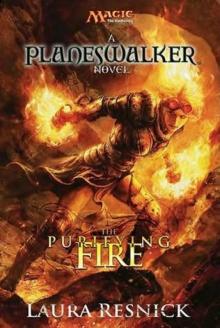 The Purifying Fire p-2
The Purifying Fire p-2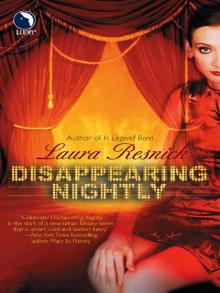 Disappearing Nightly
Disappearing Nightly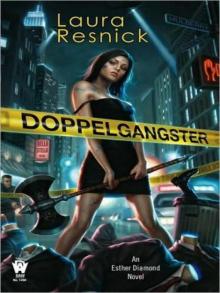 Doppelgangster
Doppelgangster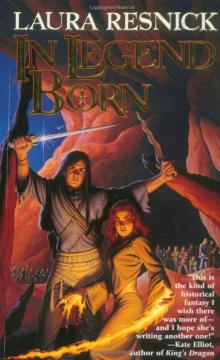 In Legend Born
In Legend Born The Destroyer Goddess
The Destroyer Goddess The Purifying Fire: A Planeswalker Novel
The Purifying Fire: A Planeswalker Novel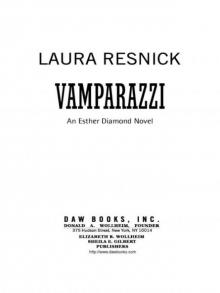 Vamparazzi
Vamparazzi A Wilder Name
A Wilder Name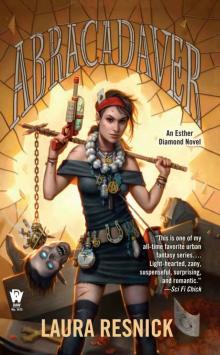 Abracadaver (Esther Diamond Novel)
Abracadaver (Esther Diamond Novel)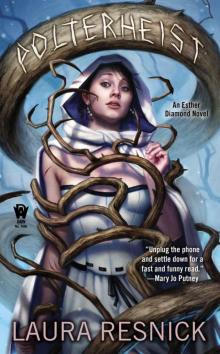 Polterheist: An Esther Diamond Novel
Polterheist: An Esther Diamond Novel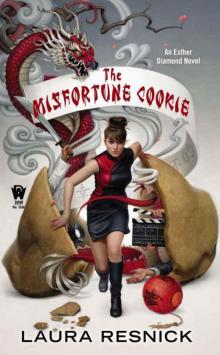 The Misfortune Cookie ed-6
The Misfortune Cookie ed-6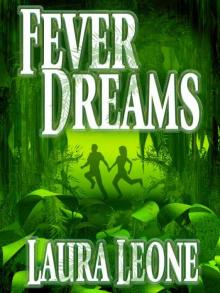 Fever Dreams
Fever Dreams The White Dragon
The White Dragon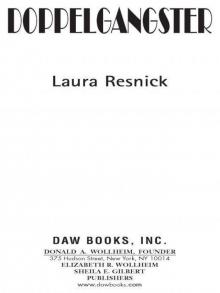 Dopplegangster
Dopplegangster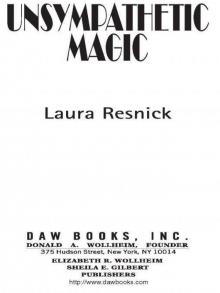 Unsympathetic Magic
Unsympathetic Magic